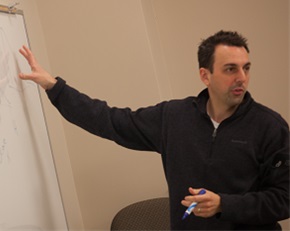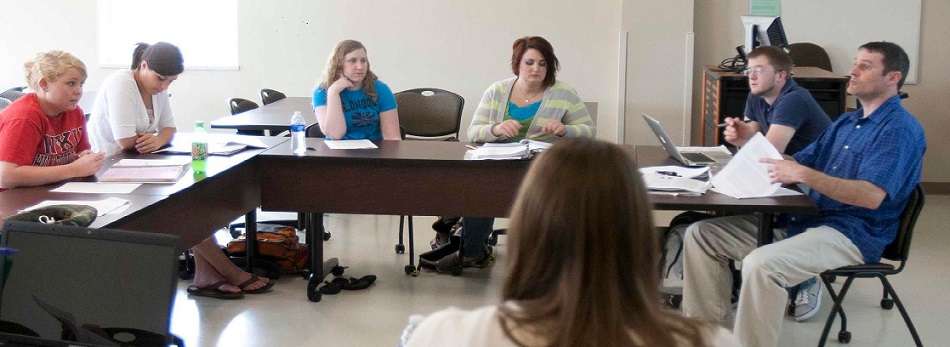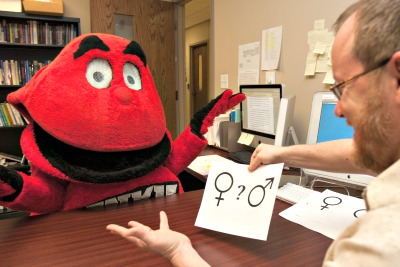Undergraduate Courses - Department of Psychological Sciences
Psychology courses offered by Department of Psychological Sciences faculty begin with the PSYS prefix. Some courses offered by the Department of Psychological Sciences are also offered in the Department of Psychology (PSY). Please consult your degree program to determine which courses will count toward your degree requirements.
Please see the course rotation schedule to see which semesters courses are offered.
PSYS 100 / PSY 100 / PSYC 100C. INTRODUCTION TO PSYCHOLOGY. (3 hours) An introductory course dealing with principles of behavior, scientific methods of psychology, measurement, learning, perception, motivation, development, personality, abnormal behavior, social behavior, intelligence, and other topics.
PSYS 160. INTRODUCTION TO BIOPSYCHOLOGY. (3 hours) An introductory class emphasizing the contributions of molecular, cellular, physiological, and evolutionary biology to the scientific understanding of psychological processes. Topics include the brain and nervous system, sensation and perception, hormones and behavior, and the interaction of genes and environment. Colonnade E-NS
PSYS 161. INTRODUCTION TO BIOPSYCHOLOGY LABORATORY. (1 hour) Prerequisites: PSYS160 as prerequisite or corequisite. A laboratory class that accompanies an introductory class emphasizing the contributions of molecular, cellular, physiological, and evolutionary biology to the scientific understanding of psychological processes. This class provides hands-on experience in a cross section of techniques used in this area of science. Colonnade E-NS lab
PSYS 175. UNIVERSITY EXPERIENCE - PSYS. (1 hour) Transition to university experience for Psychological Science majors. Topics include learning skills, campus resources, research tools, exploration of majors, specializations within discipline, career trends, and professional development.
PSYS 210 / PSY 210. RESEARCH METHODS IN PSYCHOLOGY. (3 hours) Prerequisites: PSYS 100 / PSY 100 or PSYS 160 with a grade of “C” or higher.
Corequisite: PSYS 211 / PSY 211.  Introduction to scientific thinking, research design, and research methods in psychology.
Includes the nature of scientific explanations, validity, reliability, measurement
scales, the rationale underlying hypothesis testing, critical evaluation of scientific
evidence presented in journals and popular media, and how to write research reports.
Introduction to scientific thinking, research design, and research methods in psychology.
Includes the nature of scientific explanations, validity, reliability, measurement
scales, the rationale underlying hypothesis testing, critical evaluation of scientific
evidence presented in journals and popular media, and how to write research reports.
PSYS 211 / PSY 211. RESEARCH METHODS IN PSYCHOLOGY LABORATORY. (1 hour) Prerequisites: PSYS 100 / PSY 100 or PSYS 160 with a grade of “C” or higher. Corequisite: PSYS 210 / PSY 210. Laboratory course to accompany PSYS 210 / PSY 210. Laboratory exercises involving research design, methodology, data collection, methods of organizing and presenting data, and research report writing.
PSYS 220 / PSY 220 / PSYC 220C. INTRODUCTION TO DEVELOPMENTAL PSYCHOLOGY. (3 hours) A general course in developmental psychology covering the entire life span. Included are a description of growth stages, theories of development, and research methods of development. Colonnade E-SB / SB
PSYS 290. SUPERVISED STUDY IN PSYCHOLOGICAL SCIENCES. (1-3 hours) Prerequisite: PSYS 100 / PSY 100. Directed readings or research under faculty supervision. Students must make their own arrangements in advance for supervision by a faculty member. Does not count towards completion of the major in psychological sciences. Visit the course website for more information.
PSYS 300. WRITING IN THE PSYCHOLOGICAL SCIENCES. (3 hours) Prerequisites: ENG 200, and PSYS 160 or PSYS 100 or PSY 100. Learning to write about research in neural and behavioral science within the discipline in American Psychological Association (APA) style and for a lay audience. Colonnade F-W2
PSYS 313 / PSY 313. STATISTICS IN PSYCHOLOGY. (3 hours) Prerequisites: PSYS 210 / PSY 210 and PSYS 211 / PSY 211 with a grade of "C" or better. Methods of organizing, describing, and analyzing psychological data.
PSYS 321. CHILD DEVELOPMENTAL PSYCHOLOGY. (3 hours) Prerequisite: PSYS 100 / PSY 100 or PSYS 160 or PSYS 220 / PSY 220. An introduction to the factors influencing normal psychological development during infancy and childhood. Theories, methodology, and current research in child development, including prenatal, physical, language, cognitive, social, and personality development, are considered.
PSYS 322. LABORATORY IN DEVELOPMENTAL PSYCHOLOGY. (1) Prerequisite: PSYS / PSY 210 with a grade of C or better or permission of the instructor. Prerequisite / Corequisite: PSYS 321. This course provides a laboratory-based introduction to research in developmental psychology. Students will learn about the unique research designs, methodologies, and ethical concerns related to conducting developmental psychology research. At the same time students will learn some of the major methods used by developmental psychologist through hands-on experience using a variety of research techniques.
PSYS 331. PRINCIPLES OF HUMAN AND ANIMAL LEARNING. (3 hours) Prerequisites: PSYS 210 / PSY 210 and PSYS 211 / PSY 211 with a grade of "C" or better. Overview of theory and research in human and animal learning, emphasizing classical and instrumental conditioning, aversive conditioning, and comparative psychology.
PSYS 333. COGNITIVE PSYCHOLOGY. (3 hours) Prerequisites: PSYS 210 / PSY 210 and PSYS 211 / PSY 211 with a grade of "C" or better, and junior standing or permission of the instructor. Overview of theory and research in human cognition, with primary emphasis on attention, memory, judgment and decision-making, and problem solving. Cognition in special populations (e.g., elderly, brain-injured, mentally disordered) is also covered.
PSYS 334. LABORATORY IN COGNITION. (1) Prerequisite: PSYS / PSY 210 with a grade of C or better, or permission of the instructor. Prerequisite / Corequisite: PSYS 333. Laboratory emphasizing experimental design and data collection in cognitive psychology.
PSYS 350 / PSY 350. SOCIAL PSYCHOLOGY. (3 hours) Prerequisites: 21 hours of Foundations and Explorations courses, or junior
standing. A general introduction to social psychology for majors and non-majors in
psychology. The psychology of how people think about and relate to others. Topics
include love, altruism, aggression, conformity, behavior in groups, leadership, intergroup
conflict, prejudice, and persuasion. Colonnade K-SC
PSYS 353. PSYCHOLOGY OF PREJUDICE. (3 hours) Prerequisites: 21 hours of Foundations and Explorations courses, or junior status; PSYS 100 or PSY 100 or SOCL 100. Presents classic and current social-psychological theory and research in the area of prejudice and stereotyping. You will learn some of the social-cognitive principles by which these phenomena occur, and have the opportunity to apply this learning to your own life. Colonnade K-SY
PSYS 360. BEHAVIORAL NEUROSCIENCE. (3 hours) Prerequisites: PSYS 210 / PSY 210 and PSYS 211 / PSY 211 with a grade of "C" or better, or permission of the instructor. An examination of the neurological bases of human and animal behavior emphasizing brain processes and structures underlying major psychological constructs such as sensation and perception, learning and memory, motivation and emotion, communication, reproductive behavior, and neurological and psychological disorders. Only one of the two courses PSYS 360 and PSYS 362 can be counted towards the Psychological Science major or minor, or the Neuroscience minor.
PSYS 362. BEHAVIORAL NEUROSCIENCE WITH LAB. (3 hours) Prerequisites: Major or minor in Psychological Sciences, or minor in Neuroscience; PSYS/PSY 210 and PSYS/PSY 211 with a grade of "C" or better, or permission of the instructor. An examination of the neurological bases of major psychological constructs including lab-based activities such as dissections, physiological recordings and behavioral measures. Open only to psychological science minor/majors and neuroscience minors. Course Fee. Note: This new course, offered for the first time in Spring 2017, satisfies any requirement fulfilled by PSYS 360, but you may need to fill out an iCAP exception form. See your advisor for further information.
PSYS 363. SENSORY AND PERCEPTUAL SYSTEMS. (3 hours) Prerequisites: Sophomore standing or permission of the instructor. Examination of human/animal sensory and perceptual systems using neurophysiological and psychophysical methods. Examination of both subcortical and cortical brain functioning. Emphasizes the visual, tactile/haptic, and auditory systems.
PSYS 365. LABORATORY IN BEHAVIORAL NEUROSCIENCE. (1 hours) Prerequisites: PSYS 210 / PSY 210 and PSYS 211 / PSY 211 with a grade of "C" or better, and PSYS 360 as prerequisite or corequisite. Laboratory emphasizing neural anatomy and function with an emphasis on the biological bases of behavior.
PSYS 370. INDUSTRIAL / ORGANIZATIONAL PSYCHOLOGY. (3 hours) Prerequisite: PSYS 100 / PSY 100, and junior standing or permission of the instructor. The application of psychological principles and research techniques to organizational topics, such as selection, training, performance appraisal, leadership, teamwork, work stress, and employee attitudes.
PSYS 380. PSYCHOLOGY AND SCIENCE FICTION. (3 hours) Prerequisites: Junior standing and PSYS 100 or PSY 100, or permission of the instructor. Examination of mind and behavior as portrayed in science fiction.
PSYS 413. PSYCHOLOGICAL MEASUREMENT. (3 hours) Prerequisites: PSYS 210 / PSY 210 and PSYS 211 / PSY 211, or permission of the instructor. The consideration of methodological, theoretical, and ethical problems involved in test construction and use. Topics which are covered include reliability, validity, predictive efficiency, structure of human abilities, achievement tests, and projective techniques.
PSYS 415. PROGRAMMING FOR SOCIAL SCIENCES. (3 hours) Prerequisites: PSYS 210 / PSY 210 and PSYS 211 / PSY 211, or SOCL 300, SOCL 302, ECON 206, PS 301, PS 302, or PH 383, or permission of the instructor. Use a programming language to approach problems faced in the social sciences. Develop programming skill to address issues related to experiments, analyses, and simulations within a social science context.
PSYS 423. PSYCHOLOGY OF ADULT LIFE AND AGING. (3 hours) Prerequisites: Junior standing or permission of the instructor. Psychological processes in adulthood and aging. Emphasis on contemporary theories, methodological issues, and interactions of psychological, biological, social, and environmental factors in adulthood and aging. Colonnade K-SY
PSYS 424. TOPICS IN DEVELOPMENTAL PSYCHOLOGY. (3 hours) Prerequisite: PSYS 220 / PSY 220 or PSYS 321 / PSY 321 and junior standing or permission of the instructor. A consideration of special topics to acquaint students with theoretical and research issues of particular interest in developmental psychology. May be repeated for credit provided the topic differs.
PSYS 425. DEVELOPMENTAL PSYCHOPATHOLOGY. (3 hours) Prerequisites: PSYS 210 and PSYS 211 with grades of C or better, and PSYS 220 or PSYS 321 or PSYS 440, or permission of instructor. Examines the interaction between the dynamic processes underlying both normative human development and the development of psychopathology. Theoretical and empirical research will be reviewed, focusing on the psychological science of the principles of adaptation and maladaptation.
PSYS 431. PSYCHOLOGY OF LANGUAGE. (3 hours) Prerequisites: PSYS 210 / PSY 210 and PSYS 211 / PSY 211 with a grade of "C" or better, and junior standing or permission of the instructor. Overview of scientific study of human language abilities, with primary emphasis on individual psychological mechanisms.
PSYS 433. JUDGMENT AND DECISION MAKING. (3 hours) Prerequisites: PSYS 210 / PSY 210 and PSYS 211 / PSY 211 or permission of the instructor. Description and analysis of how actual decisions differ from optimal decisions. Survey of judgments under risk and uncertainty and of major topics in judgment research.
PSYS 440 / PSY 440. ABNORMAL PSYCHOLOGY. (3 hours) Prerequisites: Six hours in psychological science and/or psychology, including PSYS 100 / PSY 100 or PSYS 160, and junior standing or permission of instructor. Introduction to abnormal psychology emphasizing forms of abnormal behavior, etiology, developmental factors, interpretations, behavioral manifestations and treatment programs.
PSYS 442. PSYCHOLOGY OF SUICIDE AND SELF INJURY. (3 hours) Prerequisites: Junior standing and a grade of C or better in PSYS 440, or permission of instructor. Focuses on the study of self-harm behavior, specifically on suicide and self-injury. Topics include theories of suicide, risk and protective factors, assessing and managing suicide risk in clinical settings, treatment for suicidal patients, ethics, nonsuicidal self-injury, the neurobiology of suicide, and prevention and post-vention.
PSYS 444. PSYCHOLOGY OF SUBSTANCE USE DISORDERS. (3 hours) Prerequisites: PSYS 100 or PSYS 160, and at least junior standing. Focuses on the study of substance use disorders, including definitions, psychopharmacology, theories of addiction, and evidence-based assessment and treatment of substance use disorders in clinical and research settings.
PSYS 450. PSYCHOLOGY OF PERSONALITY. (3 hours) Prerequisites: Six hours of psychology, including PSYS 100 / PSY 100 and junior standing or permission of instructor. Overview of the major theoretical approaches to the study of personality, including historical as well as contemporary theorists, avenues of analysis, and concepts.
PSYS 451. PSYCHOLOGY OF RELIGION. (3 hours) Prerequisites: PSYS 100 or PSY 100 or PSYS 160, and junior standing. Classical theories and current research in the psychology of religion.
PSYS 453. PSYCHOLOGY OF WOMEN. (3 hours) Prerequisites: Six hours in psychology, including PSYS 100 / PSY 100, and junior standing. Scientific study of the behavior and mental processes of girls and women. Topics include gender differences and similarities, inclusion of females in psychological research, psychological development of girls and women, sexuality, and mental health issues.
PSYS 462. FUNDAMENTALS OF COGNITIVE NEUROSCIENCE. (3 hours) Prerequisites: PSYS 210/PSYS 211 with a C or better or permission of the instructor. Introduction to the neural basis of learning and memory. Topics include cellular and molecular mechanisms of learning and memory, neural substrates of different learning and memory systems, impairment of learning and memory tied to brain disorders.
PSYS 463. EVOLUTIONARY PSYCHOLOGY. (3 hours) Prerequisites: PSYS 160 or PSYS 100 or PSY 100, and junior standing, or permission of the instructor. A survey of the research methods and core concepts of evolutionary psychology as they apply to human adaptive problems, including problems of survival, sex and mating, parenting and kinship, and aggression.
PSYS 465. PSYCHOPHARMACOLOGY. (3 hours) Prerequisites: Junior standing or permission of the instructor. Examination of psychoactive drugs and their effects upon the brain and neural mechanisms responsible for mind and behavior.
PSYS 473. TRAINING IN BUSINESS AND INDUSTRY. (3 hours) Prerequisite: MGT 311 or PSYS 370 or permission of the instructor. An introduction of theories, research, and methods of training needs analysis, program design, implementation, and evaluation. Equivalent to MGT 473.
PSYS 481 / PSY 481. HISTORY OF PSYCHOLOGY. (3 hours) Prerequisites: Nine hours in psychological science and/or psychology, including PSYS 100 / PSY 100 or PSYS 160, and junior standing or permission of instructor. Overview of major historical developments in psychology and related scientific disciplines, such as medicine, neurophysiology, and physics. Emphasizes developments over the past 500 years. History of the scientific study of human/animal behavior, as well as cognitive, perceptual, and mental functioning.
PSYS 482. PSYCHOLOGY OF SEXUALITY. (3 hours) Prerequisite: PSYS 100 / PSY 100 or PSYS 220 / PSY  220. Explores psychological, social, emotional, spiritual and cultural aspects of
sexuality including sexual development across the life span, consensual and coercive
sexual behavior, sex and gender, sexual orientation, sexuality and religious traditions,
and sexuality education. Colonnade KY-SY
220. Explores psychological, social, emotional, spiritual and cultural aspects of
sexuality including sexual development across the life span, consensual and coercive
sexual behavior, sex and gender, sexual orientation, sexuality and religious traditions,
and sexuality education. Colonnade KY-SY
PSYS 490. RESEARCH, READINGS OR SPECIAL PROJECTS IN PSYCHOLOGY. Prerequisites: PSYS 100 / PSY 100, junior standing, and permission of the faculty project supervisor. Advanced students will conduct research and/or readings in psychological science under the direction of the faculty. The course may be repeated. No more than six credits will count toward completion of the extended option of the psychological science major, and no more than three credit hours will count toward completion of the non-extended option of the major or the psychological science minor. Visit the PSYS 490 link above for more information.
PSYS 499 / PSY 499. SENIOR SEMINAR IN PSYCHOLOGY. (3 hours) Prerequisites: 12 hours in psychological science and/or psychology, including PSYS/PSY 100 or PSYS 160, and senior level classification. Seminar in which major concepts and issues in psychology are considered. Directed reading, guest lectures, field trips, and / or oral reports by students are utilized.
Related Links:

Psychological Sciences

